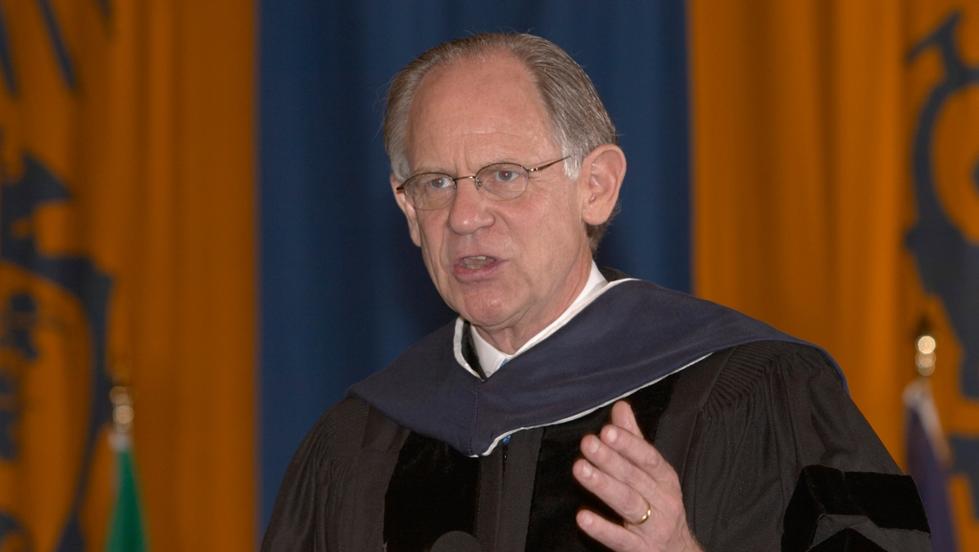
The last Republican to be elected by Delawareans as governor and to represent them in Congress, he was widely known as a dedicated public servant who brought a bipartisan approach to policymaking. He served as governor from 1985 to 1992 and as the state’s lone member of the U.S. House of Representatives from 1993 to 2011. Other positions included lieutenant governor of Delaware (1981-85) and a member of the state’s General Assembly in both the House of Representatives and Senate (1966-76).
Born in Wilmington, Del., on July 2, 1939, Castle attended the Tower Hill School before coming to Hamilton, where he earned his degree in economics and served as vice president of his senior class. He then proceeded to Georgetown University Law Center, where he earned his J.D. in 1964.
Following his admission to the bar, Castle returned to Wilmington and joined the law firm Connolly, Bove and Lodge. From 1965-66, he served as Delaware’s deputy attorney general before his election to the state’s House of Representatives. Two years later he won a seat in the Delaware senate where he remained for eight years.
In 1976, Castle returned to the full-time practice of law but was soon called again to public service when, in 1981, he became lieutenant governor. As Delaware’s chief executive, Governor Castle cut income taxes three times, balanced eight state budgets, and created thousands of jobs.
A published obituary noted, “A strong public education advocate, Governor Castle created the Focus on the First Sixty Months initiative, making him one of the first state leaders to acknowledge the importance of early childhood education in a student’s ability to learn. His budget proposals increased teachers’ pay and reduced class size to ensure Delaware could compete with other states.”
In addition, his administration’s Environmental Legacy program aimed to protect and preserve forests, wetlands, and beaches, winning recognition for its foresight and impact.
In Washington, Congressman Castle was a founding member of the Republican Main Street Partnership, an organization for centrists within his party, to help move people from welfare to work, support fiscally responsible government, improve public education, and protect the community. He served on the House Committee on Financial Services, Committee on Education and Workforce, and the Permanent Select Committee on Intelligence.
Castle helped shape the Welfare Reform Act of 1996, drive the Balanced Budget Act of 1997 to successful passage, and write and pass No Child Left Behind legislation. He wrote the law that created the 50 State Quarters Program and was a co-sponsor in the successful passage of The Brady Bill, which required a five-day waiting period for the purchase of a gun and the implementation of computerized instant background checks. In 2010, Castle was one of 15 Republican house members to vote in favor of repealing the U.S. military’s “Don’t Ask, Don’t Tell” ban on openly gay service members.
“There’s one word that comes to mind when I think of Mike Castle: dignity,” former President Joe Biden posted on X following the announcement of Castle’s death. “Riding the train back and forth together to Washington for nearly two decades, I got to know Mike as a thoughtful and kind man — a colleague who became a true friend.”
For his work on healthcare issues, Castle received the American Cancer Society’s National Distinguished Advocacy Award for 2007. He also served on many boards, most recently as chair of Research!America. In 2004, Castle delivered Hamilton’s Commencement address, and he received an honorary degree from the College in 1987.
Known as down-to-earth, Castle enjoyed small town parades on July 4th and Halloween, when he dressed as Frankenstein for families who visited the Governor’s House and for parades in each county. A voracious reader, he loved the outdoors and cheering for Philadelphia sports teams.
Mike Castle, whose fifth great-grandfathers were founding fathers Benjamin Franklin and Daniel Carroll, is survived by his wife of over 33 years, Jane DiSabatino, and many nieces, nephews, great-nieces, and great-nephews.
Posted August 15, 2025
